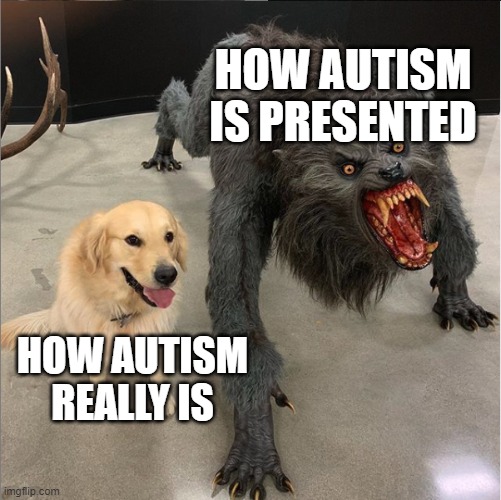The profitable autism market
ASPartOfMe
Veteran

Joined: 25 Aug 2013
Age: 66
Gender: Male
Posts: 34,468
Location: Long Island, New York
Autism acceptance month: Raising awareness or manufacturing a market?
Alicia A. Broderick is a professor of education at Montclair State University. She is a disability studies scholar and a scholar of Critical Autism Studies. She is also the author of the new book, “The Autism Industrial Complex: How Marketing, Branding and Investment Turned Autism into Big Business.”
But here’s what you’re less likely to see or hear about this month, and it’s one of the most important things about which we need to be raising critical awareness: the industrial-scale commodification of autistic people. And how these initiatives are actually part of the money-making machine.
While Autism Awareness Month has been celebrated for more than 50 years, the last decade and a half’s “awareness” initiatives and their fear-mongering rhetoric — autism is an enemy, it’s an epidemic, and it’s coming for your children — were masterfully crafted to generate a market of willing and eager consumers: consumers of autism intervention products. That’s not raising awareness, that’s manufacturing a market.
Since at least 2011, the autistic community has decried these events each April, and has advocated instead for the acceptance and valuing of the autistic experience, and the nurturing of autistic agency, liberation, and pride.
By 2021, many (though not all) of the largest autism advocacy organizations had jettisoned their “autism awareness” initiatives and rebranded to get on board with April as “Autism Acceptance Month” (and many are also busily appropriating the language and iconography of “neurodiversity” into their own PR, logos, and brands.)
But before we celebrate this as a victory for autistic activism, let’s ask why (or why now)?
Why this kinder, gentler, shift to autism acceptance, to valuing of neurodiversity?
Perhaps as a society we have genuinely experienced growth, and that is almost certainly true, to a certain extent. But that’s not the only reason.
The other answer is that it now benefits the autism industries to rebrand.
And the “valuing of autistic people” branding serves at least in part to obscure the “value” of autistic people as commodities for the autism industries.
It’s about the money. It has been and it always will be.
Every autistic 2-year-old sets in motion a chain of commercial transactions: consultations, evaluations, diagnoses; infinite varieties of therapies, supports, services, counseling and other interventions, as well as pharmaceuticals and even research dollars.
Wall Street is certainly no stranger to this market. Research firms are producing bullish forecasts for the autism intervention industries
(both ABA intervention and pharmaceutical intervention subsectors), while private equity and venture capital firms are aggressively acquiring autism-related assets.
There’s even a meet-and-greet summit later this month that puts LLCs selling autism interventions (mostly ABA) in direct conversation with private equity firms, venture capitalists and other potential investors.
For the last 30 years, behavioral intervention services have dominated, and virtually monopolized, the marketplace.
The autism markets are booming, and they are globalizing. However, the substantial and ever-increasing investment and growth in these industries is not centrally driven by what’s best, ethical, right or just for, let alone desired by, autistic people. The engine of that growth, rather, is driven by the industries’ vast potential for profit generation. Period.
We should always ask — and not just every April — who benefits?
The booming autism industries ultimately may or may not improve the lives of autistic people. But they certainly seem to be benefiting the many non-autistic people who profit from their existence.
_________________
Professionally Identified and joined WP August 26, 2013
DSM 5: Autism Spectrum Disorder, DSM IV: Aspergers Moderate Severity
It is Autism Acceptance Month
“My autism is not a superpower. It also isn’t some kind of god-forsaken, endless fountain of suffering inflicted on my family. It’s just part of who I am as a person”. - Sara Luterman
always in everything "follow the money" and "who benefits"??? The almighty dollar is the deciding factor in almost every case.
_________________
https://oldladywithautism.blog/
"Curiosity is one of the permanent and certain characteristics of a vigorous intellect.” Samuel Johnson
ASPartOfMe
Veteran

Joined: 25 Aug 2013
Age: 66
Gender: Male
Posts: 34,468
Location: Long Island, New York
_________________
Professionally Identified and joined WP August 26, 2013
DSM 5: Autism Spectrum Disorder, DSM IV: Aspergers Moderate Severity
It is Autism Acceptance Month
“My autism is not a superpower. It also isn’t some kind of god-forsaken, endless fountain of suffering inflicted on my family. It’s just part of who I am as a person”. - Sara Luterman
| Similar Topics | |
|---|---|
| Autism |
13 Mar 2024, 7:44 am |
| Autism and Suicide |
Yesterday, 9:25 pm |
| best books on autism |
06 Mar 2024, 3:45 pm |
| Autism Question. |
10 Mar 2024, 6:30 pm |








